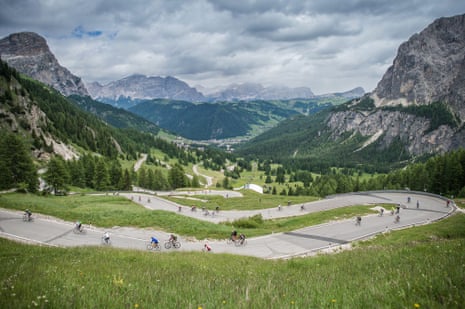Yesterday (21 June) was the 10th anniversary Sellaronda Bike Day in the Italian Dolomites. The event is held twice a year and involves closing off a 33-mile loop of roads, including four mountain passes, to motorised traffic. Bus services are suspended and workers have to arrive early to beat the 8.30am road closure which affects the communities of Alta Badia, Val Gardena, Arabba and Canazei. And it’s all so that thousands of people can get on their bikes and have some of the most scenic roads in Europe exclusively to themselves.
I was one of an estimated 20,000 cyclists who took part in yesterday’s ride. It felt like being in a closed-road sportive with one big difference – it was entirely free.
To a British cyclist used to hearing about closed-road events being sabotaged by protestors, it was a real eye-opener, and not just in terms of the stunning scenery.
Being a non-competitive event with a route you can join and leave at any of several points along the way made it feel more welcoming and inclusive than the typical British sportive. Though the climbs are quite testing – gradients averaging seven per cent and lengths up to seven miles – I saw children riding mountain bikes, toddlers being towed in trailers and, in one case, a young teenager being pulled along by his dad with a piece of rope tied between their bikes.
If you want a free, closed-road bike ride in the UK, your choices are limited and dramatic natural scenery is in short supply. There’s RideLondon’s FreeCycle, taking place on 1 August, or the Sky Rides being held in 15 towns and cities throughout this year. But all these events are only four to eight miles in length.
Though it’s only fair to point out that an eight-mile city centre road closure probably affects more businesses and residents than a 30-mile loop in a remote mountain region, the small villages on the route of the Bike Day rely on tourist visitors, not all of whom are sympathetic to those who ride bikes.
Sellaronda Bike Day costs €20,000 (£14,000) to organise and promote, and the cost is shared between the local councils in the four valleys it involves. One reason for the low cost is that, unlike at UK events, the police don’t charge for enforcing the road closures, and the bus companies don’t demand compensation for lost revenue.
Oscar Alfreider, the head of tourism for Alta Badia, who rode yesterday’s route on an electric bike, says some of the region’s 600 hotel and guesthouse owners were initially sceptical when the idea was first mooted. Shops and restaurants on the four mountain passes were particularly concerned, as most of their custom came from coach parties, motorcyclists and drivers.
But Alta Badia had the advantage of already hosting one of the most popular closed-road cycling events in Europe, the Maratona dles Dolomites, which next month holds its 29th edition. 35,000 cyclists apply each year to take part, but only 9,000 are accepted, and the event is televised live on national television.
Alfreider says: “If any hotel owner or other business makes a fuss, we remind them that many of the riders are coming here for the first time – maybe they didn’t get a place on the Maratona – and many of them will return with their families.”
Alfreider’s main disappointment is with the city council of Bolzano, the regional capital, who hadn’t completed road repairs on the tricky descent from the Campolongo Pass in time for Wednesday’s event.
Interestingly, the people that did protest during the Bike Day’s early years did so for an unexpected reason.
“Shops, cafes and restaurants on the downhill sections of the route complained they weren’t getting any business because cyclists were less likely to stop for a drink or snack when they were descending. So, four years ago, we introduced a second Bike Day, in September, and changed the direction of the riders,” says Alfreider.
One of the more colourful characters taking part in yesterday’s event was Michil Costa who was riding his lovingly-restored, 120-year-old penny farthing. Costa, the owner of an eco-friendly hotel in Corvara who has been involved in the organisation of the Maratona since 1997, believes the Dolomites – a Unesco World Heritage Site – should be “healed” by the regular banning of motorised traffic. He has a “dream that within the next four to five years”, every day will be Bike Day in Alta Badia, with motorised traffic banned from its mountain roads for a few hours seven days a week.
Costa acknowledges that this idea has the support of “only 15%” of his fellow hoteliers, but says it was the same when the Maratona started. “Now all the businesses love the Maratona because it directly results in 80,000 overnight stays every year. And the Sellaronda Bike Day has also become a tourist attraction in its own right” he says.
The majority of yesterday’s riders were Italians who had driven to one of the “hub” villages where they could park their cars before joining the route on their bikes. Non-cycling tourists I spoke to said their hotels had given them plenty of warning. If they had planned to visit any of the mountain trails or passes on the Bike Day route, they had either driven to their destination before the roads were closed, or used one of the many cable cars that operate during the summer.
On 28 June a third cyclists-only event will be added to the calendar, with 39 miles of roads to be closed in a neighbouring valley for the inaugural Börz-Plose Bike Day.
- The next Sellaronda Bike Day will be on 13 September. Full information at altabadia.org and sellarondabikeday.com

Comments (…)
Sign in or create your Guardian account to join the discussion